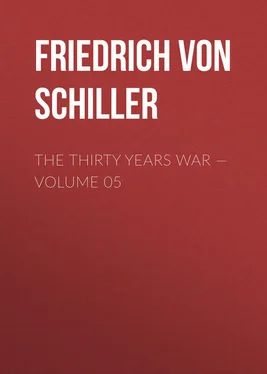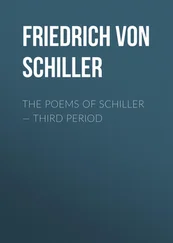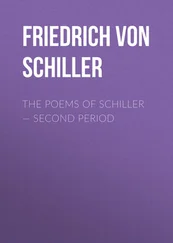Friedrich Schiller - The Thirty Years War — Volume 05
Здесь есть возможность читать онлайн «Friedrich Schiller - The Thirty Years War — Volume 05» — ознакомительный отрывок электронной книги совершенно бесплатно, а после прочтения отрывка купить полную версию. В некоторых случаях можно слушать аудио, скачать через торрент в формате fb2 и присутствует краткое содержание. Жанр: История, literature_18, foreign_antique, foreign_prose, на английском языке. Описание произведения, (предисловие) а так же отзывы посетителей доступны на портале библиотеки ЛибКат.
- Название:The Thirty Years War — Volume 05
- Автор:
- Жанр:
- Год:неизвестен
- ISBN:нет данных
- Рейтинг книги:3 / 5. Голосов: 1
-
Избранное:Добавить в избранное
- Отзывы:
-
Ваша оценка:
- 60
- 1
- 2
- 3
- 4
- 5
The Thirty Years War — Volume 05: краткое содержание, описание и аннотация
Предлагаем к чтению аннотацию, описание, краткое содержание или предисловие (зависит от того, что написал сам автор книги «The Thirty Years War — Volume 05»). Если вы не нашли необходимую информацию о книге — напишите в комментариях, мы постараемся отыскать её.
The Thirty Years War — Volume 05 — читать онлайн ознакомительный отрывок
Ниже представлен текст книги, разбитый по страницам. Система сохранения места последней прочитанной страницы, позволяет с удобством читать онлайн бесплатно книгу «The Thirty Years War — Volume 05», без необходимости каждый раз заново искать на чём Вы остановились. Поставьте закладку, и сможете в любой момент перейти на страницу, на которой закончили чтение.
Интервал:
Закладка:
In return for these important cessions, France engaged to effect a diversion in favour of the Swedes, by commencing hostilities against the Spaniards; and if this should lead to an open breach with the Emperor, to maintain an army upon the German side of the Rhine, which was to act in conjunction with the Swedes and Germans against Austria. For a war with Spain, the Spaniards themselves soon afforded the desired pretext. Making an inroad from the Netherlands, upon the city of Treves, they cut in pieces the French garrison; and, in open violation of the law of nations, made prisoner the Elector, who had placed himself under the protection of France, and carried him into Flanders. When the Cardinal Infante, as Viceroy of the Spanish Netherlands, refused satisfaction for these injuries, and delayed to restore the prince to liberty, Richelieu, after the old custom, formally proclaimed war at Brussels by a herald, and the war was at once opened by three different armies in Milan, in the Valteline, and in Flanders. The French minister was less anxious to commence hostilities with the Emperor, which promised fewer advantages, and threatened greater difficulties. A fourth army, however, was detached across the Rhine into Germany, under the command of Cardinal Lavalette, which was to act in conjunction with Duke Bernard, against the Emperor, without a previous declaration of war.
A heavier blow for the Swedes, than even the defeat of Nordlingen, was the reconciliation of the Elector of Saxony with the Emperor. After many fruitless attempts both to bring about and to prevent it, it was at last effected in 1634, at Pirna, and, the following year, reduced into a formal treaty of peace, at Prague. The Elector of Saxony had always viewed with jealousy the pretensions of the Swedes in Germany; and his aversion to this foreign power, which now gave laws within the Empire, had grown with every fresh requisition that Oxenstiern was obliged to make upon the German states. This ill feeling was kept alive by the Spanish court, who laboured earnestly to effect a peace between Saxony and the Emperor. Wearied with the calamities of a long and destructive contest, which had selected Saxony above all others for its theatre; grieved by the miseries which both friend and foe inflicted upon his subjects, and seduced by the tempting propositions of the House of Austria, the Elector at last abandoned the common cause, and, caring little for the fate of his confederates, or the liberties of Germany, thought only of securing his own advantages, even at the expense of the whole body.
In fact, the misery of Germany had risen to such a height, that all clamorously vociferated for peace; and even the most disadvantageous pacification would have been hailed as a blessing from heaven. The plains, which formerly had been thronged with a happy and industrious population, where nature had lavished her choicest gifts, and plenty and prosperity had reigned, were now a wild and desolate wilderness. The fields, abandoned by the industrious husbandman, lay waste and uncultivated; and no sooner had the young crops given the promise of a smiling harvest, than a single march destroyed the labours of a year, and blasted the last hope of an afflicted peasantry. Burnt castles, wasted fields, villages in ashes, were to be seen extending far and wide on all sides, while the ruined peasantry had no resource left but to swell the horde of incendiaries, and fearfully to retaliate upon their fellows, who had hitherto been spared the miseries which they themselves had suffered. The only safeguard against oppression was to become an oppressor. The towns groaned under the licentiousness of undisciplined and plundering garrisons, who seized and wasted the property of the citizens, and, under the license of their position, committed the most remorseless devastation and cruelty. If the march of an army converted whole provinces into deserts, if others were impoverished by winter quarters, or exhausted by contributions, these still were but passing evils, and the industry of a year might efface the miseries of a few months. But there was no relief for those who had a garrison within their walls, or in the neighbourhood; even the change of fortune could not improve their unfortunate fate, since the victor trod in the steps of the vanquished, and friends were not more merciful than enemies. The neglected farms, the destruction of the crops, and the numerous armies which overran the exhausted country, were inevitably followed by scarcity and the high price of provisions, which in the later years was still further increased by a general failure in the crops. The crowding together of men in camps and quarters — want upon one side, and excess on the other, occasioned contagious distempers, which were more fatal than even the sword. In this long and general confusion, all the bonds of social life were broken up; — respect for the rights of their fellow men, the fear of the laws, purity of morals, honour, and religion, were laid aside, where might ruled supreme with iron sceptre. Under the shelter of anarchy and impunity, every vice flourished, and men became as wild as the country. No station was too dignified for outrage, no property too holy for rapine and avarice. In a word, the soldier reigned supreme; and that most brutal of despots often made his own officer feel his power. The leader of an army was a far more important person within any country where he appeared, than its lawful governor, who was frequently obliged to fly before him into his own castles for safety. Germany swarmed with these petty tyrants, and the country suffered equally from its enemies and its protectors. These wounds rankled the deeper, when the unhappy victims recollected that Germany was sacrificed to the ambition of foreign powers, who, for their own ends, prolonged the miseries of war. Germany bled under the scourge, to extend the conquests and influence of Sweden; and the torch of discord was kept alive within the Empire, that the services of Richelieu might be rendered indispensable in France.
But, in truth, it was not merely interested voices which opposed a peace; and if both Sweden and the German states were anxious, from corrupt motives, to prolong the conflict, they were seconded in their views by sound policy. After the defeat of Nordlingen, an equitable peace was not to be expected from the Emperor; and, this being the case, was it not too great a sacrifice, after seventeen years of war, with all its miseries, to abandon the contest, not only without advantage, but even with loss? What would avail so much bloodshed, if all was to remain as it had been; if their rights and pretensions were neither larger nor safer; if all that had been won with so much difficulty was to be surrendered for a peace at any cost? Would it not be better to endure, for two or three years more, the burdens they had borne so long, and to reap at last some recompense for twenty years of suffering? Neither was it doubtful, that peace might at last be obtained on favourable terms, if only the Swedes and the German Protestants should continue united in the cabinet and in the field, and pursued their common interests with a reciprocal sympathy and zeal. Their divisions alone, had rendered the enemy formidable, and protracted the acquisition of a lasting and general peace. And this great evil the Elector of Saxony had brought upon the Protestant cause by concluding a separate treaty with Austria.
Читать дальшеИнтервал:
Закладка:
Похожие книги на «The Thirty Years War — Volume 05»
Представляем Вашему вниманию похожие книги на «The Thirty Years War — Volume 05» списком для выбора. Мы отобрали схожую по названию и смыслу литературу в надежде предоставить читателям больше вариантов отыскать новые, интересные, ещё непрочитанные произведения.
Обсуждение, отзывы о книге «The Thirty Years War — Volume 05» и просто собственные мнения читателей. Оставьте ваши комментарии, напишите, что Вы думаете о произведении, его смысле или главных героях. Укажите что конкретно понравилось, а что нет, и почему Вы так считаете.











